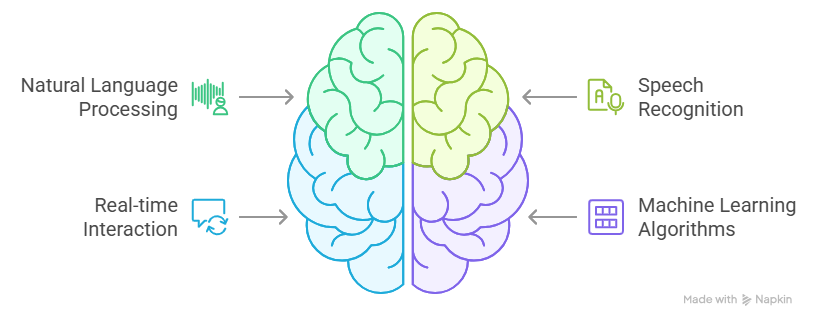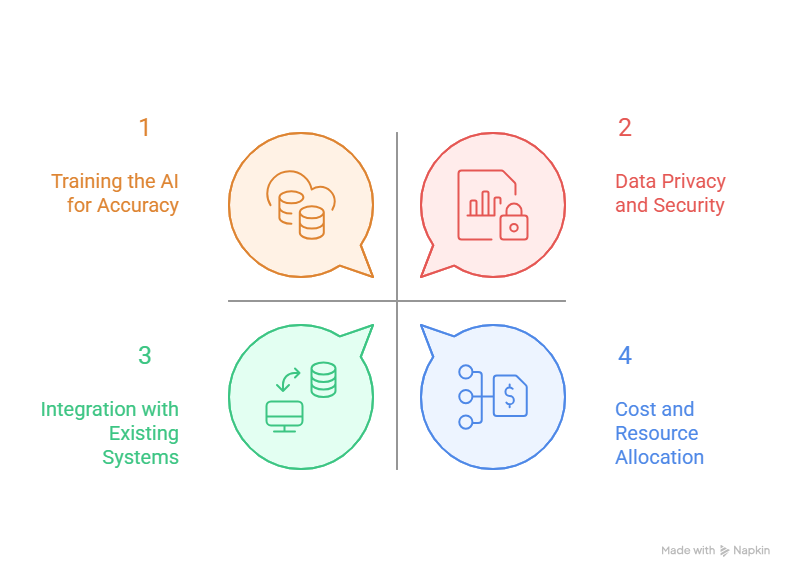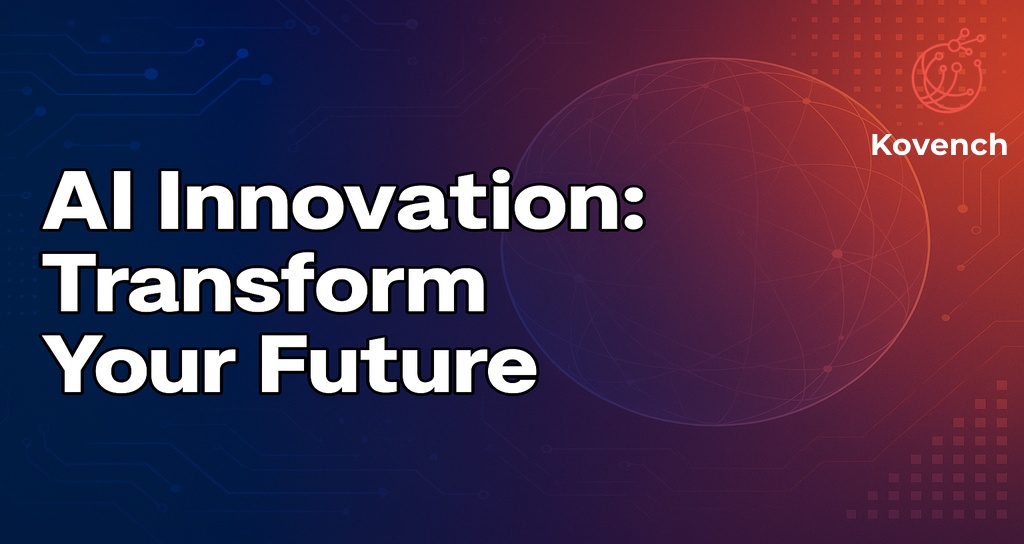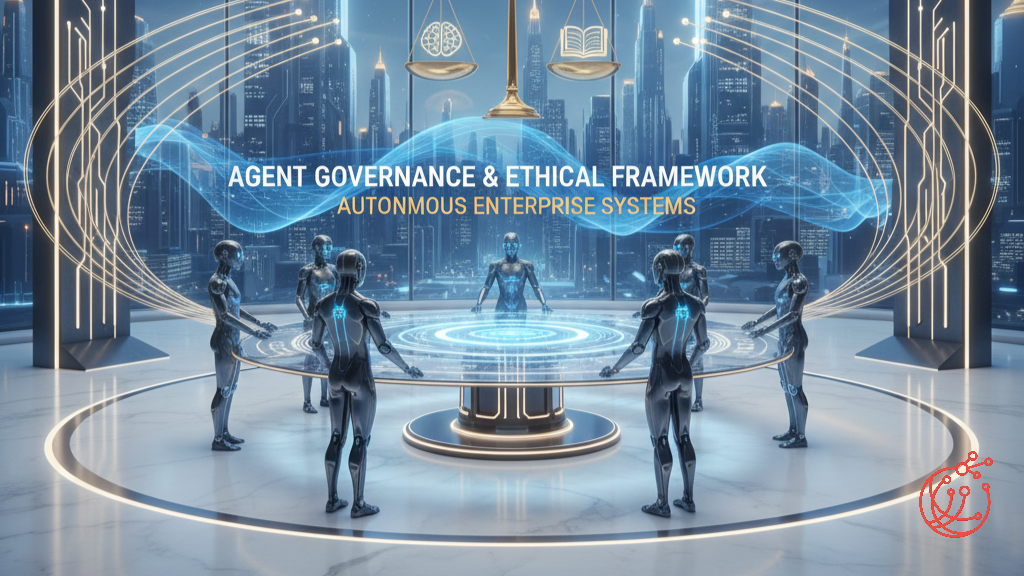Table Of Contents
1 Introduction to AI Solutions in Business
Building an AI solution is a transformative step for businesses aiming to enhance operational efficiency and drive innovation. This guide will walk you through the essential stages of creating a tailored AI strategy, from understanding core technologies to practical implementation. By leveraging AI solutions, businesses can deliver more personalized, efficient, and scalable interactions, setting a new standard in customer support and engagement. According to Grand View Research, the global conversational AI market is expected to reach $18.4 billion by 2026, driven by increasing demand for automation in customer service.
Whether you’re new to AI or looking to optimize existing systems, this introduction sets the foundation for building an AI solution that meets your unique business needs.
For an overview of the growing impact of AI in customer interactions and its potential for businesses, check out this conversational AI market report. Additionally, learn how Amazon is integrating generative artificial intelligence into its Alexa platform, bringing cutting-edge innovation to voice-powered services, with an anticipated increase in usage by 20% by 2025.
1.1. The Rise of AI in Business
AI is rapidly transforming business by automating tasks, enhancing decision-making, and improving customer interactions. In 2025, over 70% of companies will use AI in functions like marketing, customer service, and operations to boost efficiency and competitiveness. Tools like ChatGPT, Salesforce Einstein, and IBM Watsonx lead this shift, enabling smarter workflows and personalized experiences. Businesses investing in AI report faster support, cost savings, and better user engagement, making AI adoption essential for staying competitive in today’s market.
At Kovench, we understand the importance of leveraging these AI tools to maximize your return on investment (ROI). By implementing AI solutions tailored to your specific business needs, we help you streamline operations and enhance customer engagement, ultimately driving profitability.
1.2. Why You Need an AI Voice Agent for Your Business
An AI voice agent is essential for your business because it provides 24/7 customer support, reduces wait times, and automates routine tasks like appointment scheduling and FAQs. This enhances customer satisfaction and operational efficiency. The AI voice agent can handle multiple calls simultaneously, freeing staff to focus on complex issues while ensuring no customer is missed. Additionally, AI voice agents personalize interactions, boost sales through upselling, and lower costs by reducing the need for extra human agents. This technology enables scalable, consistent, and seamless customer experiences that align with your brand voice, driving growth and competitive advantage.
At Kovench, we specialize in developing AI voice agents that not only meet your operational needs but also enhance your customer interactions, leading to increased sales and improved customer loyalty. By partnering with us, you can achieve greater ROI through effective implementation of AI voice technology tailored to your business objectives.
1.3. The Role of AI Voice Agents in Modern Customer Service
AI voice agents play a crucial role in modern customer service by providing 24/7 availability, automating routine tasks, and enhancing personalization through natural language understanding. They swiftly engage customers, resolve common inquiries, and efficiently route complex issues to human agents, improving response times and customer satisfaction. Additionally, AI voice agents reduce operational costs and support call center management with analytics that monitor service quality and customer sentiment. This combination of automation and human support boosts business efficiency and delivers a seamless, accessible customer experience across time zones and languages.
At Kovench, we leverage AI voice agents to help our clients achieve greater ROI by streamlining their customer service operations. For instance, a retail client implemented our AI voice solution, resulting in a 30% reduction in call handling time and a significant increase in customer satisfaction scores. This not only improved their service efficiency but also allowed them to allocate resources more effectively, ultimately driving higher sales.
2. Understanding AI Voice Agents
AI voice agents are intelligent systems that use voice recognition, natural language processing (NLP), and machine learning to understand and respond to spoken language in real time. They convert speech to text, interpret user intent, and generate natural-sounding voice replies, enabling seamless, human-like conversations. These agents operate 24/7 to handle tasks such as scheduling, order tracking, and customer support, improving efficiency and user experience. Powered by technologies like automatic speech recognition (ASR), natural language understanding (NLU), and text-to-speech (TTS), AI voice agents continuously learn from interactions to enhance accuracy and personalization across industries.
2.1. What is an AI Voice Agent?

An AI voice agent is an advanced technology that facilitates communication between users and systems through voice interactions. These agents are designed to:
- Understand spoken language: They utilize voice recognition to accurately interpret user commands and inquiries.
- Respond naturally: By employing natural language processing, they generate responses that sound human-like, making interactions more engaging.
- Learn from interactions: Through machine learning, AI voice agents improve their performance over time by analyzing past conversations and user feedback.
In essence, AI voice agents serve as a bridge between technology and users, enhancing the overall customer experience by providing efficient and personalized service. At Kovench, we are committed to helping businesses harness the power of AI voice agents to transform their customer service landscape and achieve their business goals effectively.
2.2. Key Features of AI Voice Agents
Key features of AI voice agents include:
- Context awareness: This enables them to remember conversation history and user intent for smooth multi-turn interactions, ensuring a more personalized experience for users.
- Emotional modulation: AI voice agents can adjust tone and responses based on user sentiment, enhancing user engagement and satisfaction.
- Smart interruption handling: They manage overlapping speech naturally, allowing for a more fluid conversation that mimics human interaction.
- Multilingual and cultural adaptation: This feature supports global reach, making it easier to communicate with diverse customer bases and cater to international markets.
- Integration with backend systems: AI voice agents can connect with systems like CRMs to perform tasks such as booking appointments or updating records, streamlining operations and improving efficiency.
- Fallback to human agents: When necessary, they can seamlessly transfer the conversation to a human agent for more complex issues, ensuring that customer needs are met effectively.
- Data privacy and compliance: Ensuring that user data is handled securely and in accordance with regulations is a priority, fostering trust and reliability.
- Continuous improvement: They benefit from rapid retraining on real interaction data, enhancing their performance over time and adapting to changing user needs.
2.3. How AI Voice Agents Work
AI voice agents work by following a structured process:
- Capturing spoken input: They use a microphone to capture the user's voice.
- Converting speech to text: This is done through Automatic Speech Recognition (ASR), which translates spoken words into written text.
- Understanding intent and context: Natural Language Processing (NLP) is employed to interpret the meaning behind the text and understand the user's intent.
- Generating responses: Using large language models (LLMs), the AI voice agent formulates appropriate responses based on the user's input.
- Converting text back to speech: Text-to-Speech (TTS) technology is used to convert the generated text responses back into spoken words.
Advanced AI voice agents can also personalize interactions using customer data, handle complex queries, and determine when to escalate issues to human agents. This seamless process enables natural and efficient voice-based communication for businesses.
3. Benefits of AI Voice Agents for Your Business
AI voice agents offer numerous benefits for businesses, including improved customer service, increased efficiency, and enhanced customer engagement. By automating routine inquiries, they free up human agents to focus on more complex tasks, ultimately leading to higher customer satisfaction and loyalty. Additionally, AI voice agents can operate 24/7, providing support outside of regular business hours and ensuring that customer needs are met promptly. Implementing an AI voice agent can also lead to cost savings by reducing the need for extensive customer service teams. Overall, the integration of AI voice agents can significantly enhance the operational capabilities of a business, making it more competitive in today's fast-paced market.
At Kovench, we leverage these advanced features and benefits of AI voice agents to help our clients achieve greater ROI. By implementing tailored AI solutions, we enable businesses to optimize their customer interactions, streamline operations, and ultimately drive growth. Our expertise in AI development ensures that our clients can harness the full potential of voice technology to meet their specific business goals efficiently and effectively.
3.1. Improved Customer Experience
An AI voice agent significantly improves customer experience by delivering fast, personalized, and consistent support 24/7, reducing wait times and frustration. It enables proactive communication, anticipating customer needs and resolving issues before they escalate, which boosts satisfaction and loyalty. AI-driven insights allow tailoring interactions based on real-time data, creating seamless, hyper-personalized journeys that feel intuitive and human-centered. This leads to higher engagement, reduced churn, and stronger customer relationships, ultimately driving business growth and efficiency.
At Kovench, we leverage advanced AI technologies to develop voice agents that not only enhance customer interactions but also align with your business objectives, ensuring that every engagement contributes to your bottom line.
3.2. Cost Reduction
Building an AI voice agent can significantly reduce costs by automating routine customer interactions, lowering the need for large call center staff, and minimizing human error. This leads to savings on labor, training, and operational expenses. Additionally, AI voice agents operate 24/7, improving efficiency and reducing overhead costs like office space and utilities. Leveraging cloud-based AI platforms further cuts infrastructure costs by eliminating expensive on-premises hardware. Strategic outsourcing of AI development and maintenance can also optimize spending while focusing internal resources on core business activities.
Kovench's expertise in AI development ensures that your investment in voice agents translates into substantial cost savings, allowing you to allocate resources more effectively and enhance overall operational efficiency.
3.3. Increased Efficiency and Productivity
An AI voice agent enhances efficiency and productivity by streamlining customer service processes. By handling a high volume of inquiries simultaneously, it allows human agents to focus on more complex issues that require personal attention. This not only improves response times but also increases the overall throughput of customer service operations. Furthermore, AI voice agents can analyze customer interactions to identify trends and areas for improvement, enabling businesses to refine their service strategies continuously. The result is a more agile organization that can adapt quickly to changing customer needs and market conditions, ultimately leading to improved performance and profitability.
At Kovench, we understand that increased efficiency is key to achieving greater ROI. Our AI solutions are designed to empower your workforce, enabling them to deliver exceptional service while driving productivity and growth.
3.4. 24/7 Customer Support
Offering 24/7 customer support with an AI voice agent ensures your business is always available to assist customers instantly, regardless of time zones. This availability expands your global reach, boosts customer satisfaction, and fosters loyalty by providing timely help that prevents frustration and escalated issues. It also gives your business a competitive edge by demonstrating a commitment to exceptional service, improving brand reputation, and increasing sales conversions. Implementing AI-driven 24/7 support balances efficiency and cost, enabling seamless, real-time responses that meet modern customer expectations and drive long-term growth.
3.5. Data Insights and Analytics
Data insights and analytics transform raw data into actionable knowledge that drives smarter business decisions. By collecting, cleaning, and analyzing data, AI voice agents can uncover patterns in customer interactions, preferences, and behaviors. This enables businesses to optimize service, predict trends, and personalize experiences. Key steps include:
- Defining goals: Establish clear objectives for what you want to achieve with your data analysis.
- Ensuring data quality: Clean and validate your data to ensure accuracy and reliability.
- Applying analytical techniques: Utilize methods like clustering or regression to analyze data effectively.
- Visualizing results: Create visual representations of your data to facilitate understanding and communication of insights.
Leveraging AI-powered analytics tools enhances real-time monitoring and predictive capabilities, ultimately improving customer satisfaction and operational efficiency through informed, data-driven strategies.
4. Steps to Build an AI Voice Agent for Your Business
To build an effective AI voice agent for your business, follow these essential steps:
- Identify Use Cases: Determine the specific functions your voice agent will serve, such as customer support, lead generation, or appointment scheduling.
- Choose the Right Technology: Select AI platforms and tools that align with your business needs and technical capabilities.
- Design Conversational Flows: Create intuitive dialogue paths that guide users through interactions seamlessly.
- Train the AI Model: Use historical data and customer interactions to train your voice agent, ensuring it understands context and nuances.
- Test and Iterate: Conduct thorough testing to identify areas for improvement, and continuously refine the agent based on user feedback.
- Monitor Performance: Implement analytics to track the agent's performance and make data-driven adjustments to enhance its effectiveness.
By following these steps, Kovench can help you develop a robust AI voice agent that not only meets your business objectives but also enhances customer engagement and satisfaction.
4.1. Step 1: Define Your Business Needs
Defining your business needs is the crucial first step in building an AI voice agent. Start by clearly identifying your short- and long-term business goals and the specific challenges or opportunities you want the AI to address. Gather input from stakeholders and analyze current workflows to pinpoint inefficiencies or gaps in customer service. Establish measurable objectives aligned with these goals, such as improving response times or increasing customer satisfaction. This focused needs analysis ensures your AI voice agent is tailored to deliver meaningful business outcomes and supports strategic priorities effectively. At Kovench, we assist clients in this initial phase by leveraging our expertise to facilitate comprehensive assessments that align AI capabilities with business objectives, ultimately driving greater ROI.
4.2. Step 2: Choose the Right Technology and Platform
Choosing the right technology and platform for your AI voice agent starts with prioritizing your business requirements to ensure alignment with your goals. Evaluate vendors carefully, focusing on their strengths, integration capabilities, and scalability to support future growth. Use data-driven insights to assess risks and opportunities, and seek platforms that enable seamless integration with your existing systems to maintain workflow continuity. Tailored recommendations based on your unique needs will help select a solution that enhances customer service efficiency and supports long-term business success. Kovench's consulting services can guide you through this selection process, ensuring that the technology you choose maximizes your investment and aligns with your strategic vision.
4.3. Step 3: Design Your AI Voice Agent’s Capabilities
Design your AI voice agent’s capabilities by clearly defining its core functions based on your business needs. Start by mapping out key tasks it should handle—such as answering FAQs, booking appointments, or processing orders—and the conversation flows for each. Build a comprehensive knowledge base with accurate, up-to-date information and integrate tools like calendars or CRM systems to enable action execution.
Incorporate context management to maintain natural, coherent dialogues and plan for emotional tone adjustments to enhance user experience. Finally, choose appropriate real-time data handling methods to ensure responsive, seamless interactions. This design phase sets the foundation for a functional, user-friendly AI voice agent that meets your business objectives effectively. Kovench's expertise in AI design ensures that your voice agent not only meets functional requirements but also enhances user engagement, leading to improved customer satisfaction and increased ROI.
4.4. Step 4: Integrate Natural Language Processing (NLP)
Natural Language Processing (NLP) is a core component of your AI voice agent. It enables the agent to understand user intent and generate accurate, human-like responses. Integrating NLP ensures your AI can handle a variety of languages, tones, and contexts, enhancing user experience.
4.5. Step 5: Build a Knowledge Base and Train the Model
Building a knowledge base involves collecting, organizing, and structuring relevant business data—such as FAQs, product information, and support documents—into a clear, accessible format. This data must be cleaned and categorized to ensure accuracy and ease of retrieval. Once prepared, use AI training tools to feed this knowledge into your model, focusing on core business interactions first.
At Kovench, we emphasize the importance of a well-structured knowledge base as it directly impacts the efficiency of AI solutions. By leveraging our expertise, we help clients create comprehensive knowledge bases that not only enhance the AI voice agent's performance but also lead to significant cost savings and improved customer satisfaction.
Continuously monitor performance metrics like response accuracy and user satisfaction, then iteratively expand and refine the dataset to improve the AI voice agent’s understanding and relevance. This step is essential for delivering precise, context-aware customer interactions.
4.6. Step 6: Test and Optimize Your AI Voice Agent
Test and optimize your AI voice agent by conducting thorough evaluations across diverse real-world scenarios.
- Use test calls to assess understanding of accents, slang, and noisy environments, reviewing transcripts and recordings for accuracy and naturalness.
- Implement structured testing plans covering ideal flows, edge cases, and failures, with clear success criteria.
- Continuously analyze user feedback and performance metrics to identify issues like response delays or context loss, then refine prompts, dialogue management, and technical components accordingly.
- Ensure data privacy compliance throughout.
This iterative process is essential to deliver a reliable, user-friendly AI voice agent tailored to your business needs. At Kovench, we guide our clients through this optimization phase, ensuring that their AI solutions not only meet but exceed expectations, ultimately driving greater ROI and enhancing overall business performance.
4.7. Step 7: Implement and Monitor the AI Voice Agent
To implement and monitor your AI voice agent, first deploy it in a controlled environment, ensuring all integrations and conversation flows function as designed. Grant necessary permissions, such as microphone access, and conduct thorough testing with real and simulated user interactions to identify issues. Utilize monitoring tools to track key metrics like response accuracy, latency, user satisfaction, and call logs. Continuously analyze this data to detect errors, enhance conversation flows, and update the knowledge base. Regularly maintain security by managing API keys and credentials to prevent unauthorized access and control costs. This ongoing process ensures your AI voice agent remains effective and responsive to user needs, ultimately driving greater ROI for your business.
5. Challenges in Building an AI Voice Agent
Building an AI voice agent faces key challenges, including:
- Accurate speech recognition: Achieving high accuracy across diverse accents, dialects, and speech impairments can lead to misunderstandings.
- Contextual understanding: Maintaining context in multi-turn conversations is difficult, often resulting in irrelevant responses.
- Background noise: Poor acoustics and background noise can significantly reduce recognition accuracy, necessitating advanced noise reduction techniques.
- Integration complexity: Integrating with existing legacy systems can be complex and time-consuming.
- Latency and scalability issues: Delays in response times can frustrate users, impacting their overall experience.
- Data privacy and compliance: Ensuring data privacy and compliance is critical when handling sensitive information.
Addressing these challenges demands careful design, diverse training data, and robust infrastructure.

5.1. Data Privacy and Security
Ensuring data privacy and security is a major challenge when building AI voice agents. Since these agents handle sensitive customer data, it is essential to:
- Implement end-to-end encryption to protect data during transmission and storage.
- Ensure compliance with industry standards and regulations (e.g., GDPR, HIPAA).
- Regularly audit and monitor data handling practices to detect potential vulnerabilities.
At Kovench, we assist our clients in building AI voice agents that meet the highest data security standards, ensuring their systems are both compliant and secure.
5.2. Training the AI for Accuracy
Training an AI voice agent for accuracy involves curating high-quality, diverse, and representative datasets to reduce bias and improve performance across all user groups. Key techniques include:
- Identifying and removing problematic training samples that cause errors.
- Fine-tuning model architecture to enhance performance.
- Applying data preprocessing steps like cleaning and normalization to ensure data quality.
Iterative retraining with balanced data enhances the model’s reliability, while validation on unseen data ensures robust accuracy. This process requires continuous monitoring and adjustment to maintain precision and fairness in real-world applications, ultimately delivering a more effective AI voice agent for your business.
5.3. Integration with Existing Systems
Integrating an AI voice agent with existing business systems requires a clear strategy that aligns with your operational goals. Start by assessing current systems, workflows, and data formats to identify integration points and potential challenges. Consider the following steps:
- Use scalable, standards-based architectures like APIs or microservices to enable modular, flexible connections.
- Ensure data consistency, security, and compliance by implementing authentication, encryption, and standardized protocols.
- Develop automation workflows with error handling to maintain seamless data flow.
- Thoroughly test integrations to ensure operational efficiency.
This approach maximizes your AI voice agent’s impact while preserving existing infrastructure and enhancing customer experience.
5.4. Cost and Resource Allocation
Building and maintaining an AI voice agent requires careful management of costs and resources:
- Development Costs: Initial investments in technology, infrastructure, and expertise.
- Ongoing Maintenance: Continuous monitoring, testing, and optimization require dedicated resources.
- Scalability: Planning for growth to handle increased demand efficiently.
- Training and Support: Ongoing training of the AI model and providing system support.
- Cost-Efficiency: Using cloud-based solutions to reduce infrastructure costs.
At Kovench, we help businesses balance costs and resources, ensuring high ROI while maintaining operational efficiency.
6. Best Practices for AI Voice Agent Implementation
Best practices for AI voice agent implementation include minimizing conversation latency by using efficient foundation models and prompt caching to ensure natural, fast responses. Start with simple conversational flows and iterate toward complexity. Ensure robust audio input pipelines for clear speech recognition and deploy natural filler phrases to maintain engagement during processing delays. Prioritize user privacy with end-to-end encryption and regulatory compliance. Integrate smoothly with existing business systems via solid APIs. Finally, define clear use cases, success metrics, and continuously monitor performance with real-time feedback loops to optimize accuracy and user satisfaction.
6.1. Start Small and Scale Gradually
Starting small and scaling gradually allows your business to control costs, refine strategies, and build strong customer relationships before expanding. This approach minimizes risks by letting you test and improve your AI voice agent on a manageable scale, ensuring it meets your business needs effectively. As you gain insights and confidence, you can incrementally increase its capabilities and user base, avoiding costly mistakes and resource strain. Gradual scaling also provides flexibility to adapt to market feedback and evolving technology, setting a solid foundation for sustainable growth and long-term success.
6.2. Focus on User Experience
Focusing on user experience (UX) means designing your AI voice agent to be intuitive, responsive, and empathetic to user needs. Prioritize clear, natural interactions that reduce friction and anticipate user intent. Incorporate accessibility features to serve diverse users and ensure privacy transparency to build trust. Regularly test and refine based on real user feedback to enhance satisfaction and engagement. A seamless, personalized UX not only improves customer retention but also boosts your business’s efficiency and reputation. By leveraging Kovench's expertise in AI development, businesses can implement these best practices effectively, leading to greater ROI and enhanced customer satisfaction.
6.3. Regularly Update and Improve the AI Model
Regularly updating and improving your AI voice agent is essential to maintain accuracy and relevance as data and user needs evolve. To achieve this, you should:
- Monitor performance continuously to detect model drift—when the model’s predictions degrade due to changing inputs—and retrain the model accordingly.
- Use incremental learning for gradual data changes or full retraining for significant shifts.
- Implement automated feedback loops and A/B testing to refine the model iteratively.
- Always validate updates with fresh test data to ensure improvements.
This ongoing maintenance sustains trust, enhances user experience, and keeps your AI voice agent effective in dynamic business environments.
6.4. Ensure Cross-Channel Integration
To ensure cross-channel integration for your AI voice agent, you should unify all customer touchpoints—phone, chat, email, and social media—into a seamless system. This integration enables consistent messaging and personalized interactions regardless of the channel customers use. Key steps include:
- Use shared data and analytics to track customer journeys across platforms, allowing the AI voice agent to provide context-aware responses and smooth transitions between channels.
- Prioritize strategic channel selection based on where your audience engages most.
- Employ automation tools to synchronize communications, enhancing customer experience and business efficiency.
7. AI Voice Agents in Different Industries
AI voice agents are transforming diverse industries by automating routine tasks and enhancing customer interactions. In customer service, they provide 24/7 support, handle FAQs, and improve call routing. In retail and e-commerce, they are used for order tracking, returns, and voice shopping. In healthcare, agents manage appointment scheduling, reminders, and patient intake efficiently. Financial services deploy them for secure account inquiries, fraud alerts, and basic advice. Additionally, real estate leverages AI voice agents for client engagement, property inquiries, and scheduling tours, while sales and marketing use them for lead qualification and personalized outreach.
At Kovench, we specialize in developing and optimizing AI voice agents tailored to your industry needs, ensuring that you achieve greater ROI through enhanced customer engagement and operational efficiency. By leveraging our expertise, you can stay ahead in a competitive landscape, driving business growth and customer satisfaction.
7.1. AI Voice Agents in Retail
AI voice agents in retail revolutionize customer interactions by enabling natural, real-time spoken conversations that assist with product searches, order management, and personalized recommendations. They integrate with inventory and CRM systems to provide instant support, streamline returns, and guide customers through checkout, boosting satisfaction and sales. These agents operate 24/7, reducing support costs and freeing staff for complex tasks. Successful deployment requires seamless system integration, data privacy compliance, and a consistent brand voice to enhance customer experience and maintain a competitive advantage in the evolving retail landscape. At Kovench, we specialize in implementing these AI voice solutions, ensuring that our clients achieve greater ROI through improved customer engagement and operational efficiency.
7.2. AI Voice Agents in Customer Support
AI voice agents transform customer support by providing 24/7 availability, reducing wait times, and handling routine inquiries efficiently. This boosts first-contact resolution rates up to 80% and enhances customer satisfaction. They deliver consistent, accurate responses unaffected by human factors like fatigue and support multiple languages to serve diverse customers globally. Advanced AI voice agents understand context, remember conversation history, and escalate complex issues to human agents seamlessly, ensuring smooth service continuity. These capabilities improve operational scalability, reduce costs by up to 35%, and elevate customer loyalty, making AI voice agents essential for modern customer support. Kovench's expertise in deploying these solutions allows businesses to streamline their support processes, ultimately leading to a significant increase in ROI.
7.3. AI Voice Agents in Healthcare
In healthcare, AI voice agents play a pivotal role in enhancing patient care and streamlining operations. They automate tasks such as appointment scheduling, reminders, and patient intake, reducing administrative burdens for healthcare providers. These agents offer 24/7 availability, allowing patients to schedule appointments, get reminders, and ask basic health-related questions outside of regular office hours.
AI voice agents can also assist with triaging symptoms, offering guidance on whether a visit to a doctor is necessary, and ensuring better resource allocation. By providing accurate, timely information, they improve patient satisfaction and operational efficiency while allowing healthcare professionals to focus on more critical tasks.
At Kovench, we develop AI voice solutions tailored for healthcare providers, ensuring seamless integration with existing systems and enhancing both patient experience and operational productivity.
7.4. AI Voice Agents in Finance
AI voice agents in finance streamline customer interactions by automating tasks such as account inquiries, loan processing, payment verification, and fraud alerts. They provide 24/7 secure service while reducing staffing costs and manual workload. By handling routine queries, these agents enhance efficiency and support compliance with regulations like PCI-DSS. Additionally, they deliver personalized financial insights in real time, accelerate processes like loan approvals and audit preparation, and ultimately improve customer satisfaction and operational scalability for financial institutions. At Kovench, we leverage these AI voice agents to help our clients achieve greater ROI by optimizing their customer service operations and reducing operational costs.
8. The Future of AI Voice Agents in Business
The future of AI voice agents in business is marked by rapid growth and transformative capabilities. By 2034, the market is projected to reach $47.5 billion, driven by advances in natural speech understanding, emotional intelligence, and multilingual support. AI voice agents will evolve from handling simple queries to autonomously processing transactions and anticipating customer needs, thereby enhancing efficiency and personalization. Enterprises will increasingly embed these agents into workflows for seamless automation across channels, improving scalability and customer experience. This shift promises 24/7 availability, reduced wait times, and more humanlike interactions, making AI voice agents essential for modern business communication. Kovench is at the forefront of this evolution, providing tailored solutions that empower businesses to harness the full potential of AI voice technology.
8.1. AI Advancements in Voice Technology
Advancements in AI voice technology by 2025 have transformed voice agents into highly natural, context-aware conversational partners. Large Language Models (LLMs) now enable seamless understanding and generation of speech, supporting complex, multi-turn dialogues with emotional awareness and personalization. Improvements in speech recognition accuracy, real-time processing, and multi-intent handling allow voice agents to operate efficiently across noisy environments and diverse languages. These innovations have driven widespread adoption in industries like banking, healthcare, and retail, enhancing customer interactions and business automation while emphasizing privacy and ethical use. This marks 2025 as a pivotal year for voice AI integration in business. Kovench is committed to guiding clients through these advancements, ensuring they remain competitive and achieve significant returns on their AI investments.
8.2. The Role of AI in Personalized Customer Interactions
AI plays a crucial role in personalizing customer interactions by analyzing individual behavior, preferences, and past engagements to deliver tailored experiences. It enables businesses to offer predictive recommendations, proactive support, and dynamic adaptation during conversations, enhancing customer satisfaction and loyalty.
For example, AI-powered chatbots provide personalized greetings, product suggestions, and real-time problem-solving, creating a more natural and engaging customer journey. This hyper-personalization not only improves efficiency but also fosters deeper connections, driving higher conversion rates and long-term business growth. At Kovench, we leverage advanced AI technologies to help our clients implement these solutions, ensuring they meet rising customer expectations while maximizing their return on investment.
8.3. Ethical Considerations and AI Regulations
Building an AI voice agent requires strict adherence to ethical considerations and AI regulations to ensure fairness, transparency, and accountability. Businesses must address bias in training data to prevent unfair outcomes and maintain user trust through clear disclosure of AI use. Protecting user privacy and sensitive data is essential, complying with relevant data protection laws.
Regulatory frameworks should be adaptive and collaborative, involving experts and stakeholders to keep pace with AI advancements. Continuous monitoring and audit mechanisms help ensure ethical deployment, aligning AI use with human rights and societal values. This fosters responsible, trustworthy AI integration in business operations.
9. Conclusion
Building an AI voice agent can transform your business by enhancing customer service, improving efficiency, and providing personalized interactions. By following the step-by-step process outlined—from defining goals and choosing technology to training and deployment—you can create a tailored solution that meets your unique needs. Embracing this technology not only streamlines operations but also positions your business competitively in a digital-first world.
Consider data privacy and continuous improvement as ongoing priorities to maximize your AI voice agent’s impact and customer trust. Implementing an AI voice agent is a strategic investment toward future-ready business success. At Kovench, we are committed to guiding you through this transformative journey, ensuring that your AI initiatives yield significant returns and align with your business objectives.
10. How Kovench Can Help You Build an AI Voice Agent for Your Business
Kovench simplifies building an AI voice agent by offering an intuitive platform that integrates voice recognition, natural language understanding, and CRM data for personalized customer interactions. It enables businesses to design conversation flows, develop knowledge bases, and connect with existing systems without coding. Kovench’s tools support seamless call handling, real-time analytics, and smooth handoffs between AI and human agents, boosting efficiency and customer satisfaction. This makes it ideal for entrepreneurs seeking a scalable, customizable AI voice solution tailored to their business needs.
Key Features of Kovench:
- Intuitive Platform: Kovench provides an easy-to-use interface that allows users to create and manage their AI voice agents without requiring extensive technical knowledge.
- Integration Capabilities: The platform seamlessly integrates with existing CRM systems, ensuring that customer interactions are personalized and informed by relevant data.
- Conversation Flow Design: Users can design and customize conversation flows to guide interactions, enhancing the customer experience.
- Knowledge Base Development: Kovench allows businesses to develop a comprehensive knowledge base, ensuring that the AI voice agent can provide accurate and helpful responses.
- Seamless Call Handling: The platform supports efficient call handling, allowing for smooth transitions between AI and human agents when necessary.
- Real-Time Analytics: Kovench provides real-time analytics to monitor performance and customer interactions, enabling businesses to make data-driven decisions.
By leveraging Kovench, businesses can create a powerful AI voice agent that enhances customer service, improves operational efficiency, and ultimately drives growth. This strategic implementation not only streamlines operations but also maximizes return on investment (ROI) by reducing operational costs and increasing customer engagement.







